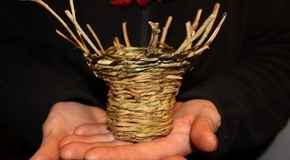 Filmed and edited by artist Israel Seoane, this short documentary series reflects on the creativity, resilience, and richness of artists, and community working together in difficult times.
Filmed and edited by artist Israel Seoane, this short documentary series reflects on the creativity, resilience, and richness of artists, and community working together in difficult times.
Come explore activities at fieldhouses located in our parks.
Vancouver Park Board's Fieldhouse Activation Program transformed former care-takers’ suites in parks or underused facilities across Vancouver into active spaces for community engaged creative practices.
In each cycle artist collectives, local food, and environmental groups are given access to these spaces in exchange for engaging neighbours, colleagues, and curious visitors in imaginative, collaborative work in parks.
These inspiring projects lead communities into deeper conversations about living in the urban environment.
Current residencies
-
-

Amy Walker
Theme: Arts
Adanac Park fieldhouse
-

Community Arts Council of Vancouver
Theme: Arts
McBride Park fieldhouse
-

Earthseed Sanctuary
Theme: Environmental Stewardship
Moberly Park fieldhouse
-

El Mashup Collective
Theme: Arts
Clinton Park fieldhouse
-

Enoki Knoll
Theme: Arts
Hadden Park fieldhouse
-

The Fig Tree Palace
Theme: Arts and social engagement
Location: Jonathan Rogers Park fieldhouse
-

Foolish Operations
Theme: Dance
Riley Park fieldhouse
-

Holding Ground
Theme: Arts
Pandora Park fieldhouse
-

Musqueam, Squamish and Tsleil-Waututh Residency in Stanley Park
Theme: Arts
Second Beach
-

Opera Lirica
Theme: Arts and music
Oak Park fieldhouse
-

Patchbay
Theme: Arts
Elm Park fieldhouse
-

Patchwork Repair Network
Theme: Arts
Slocan Park fieldhouse
-

Sankofa Sanctuary
Theme: Arts
Falaise Park fieldhouse
-

Vancouver Urban Food Forest Foundation (VUFFF)
Theme: Land based learning
Burrard View Park fieldhouse
-

Working Group on Indigenous Food
Theme: Garden and local food
Strathcona Park fieldhouse
-

Xinema
Theme: Arts
Norquay Park fieldhouse
-

Yarrow Intergenerational Society for Justice
Theme: Arts
Maclean Park fieldhouse
Parks and people: Innovative participation in public urban green space
 In 2016, Sue Palmer was awarded a Winston Churchill Travel Fellowship to undertake research into innovation in participation in public urban green space in three cities: Berlin, Germany, Portland, Orgeon, and Vancouver.
In 2016, Sue Palmer was awarded a Winston Churchill Travel Fellowship to undertake research into innovation in participation in public urban green space in three cities: Berlin, Germany, Portland, Orgeon, and Vancouver.
![]()
Parks offer a gateway to nature in the city. As a community, we can care for parks together and use these spaces to get closer to nature and each other.



















